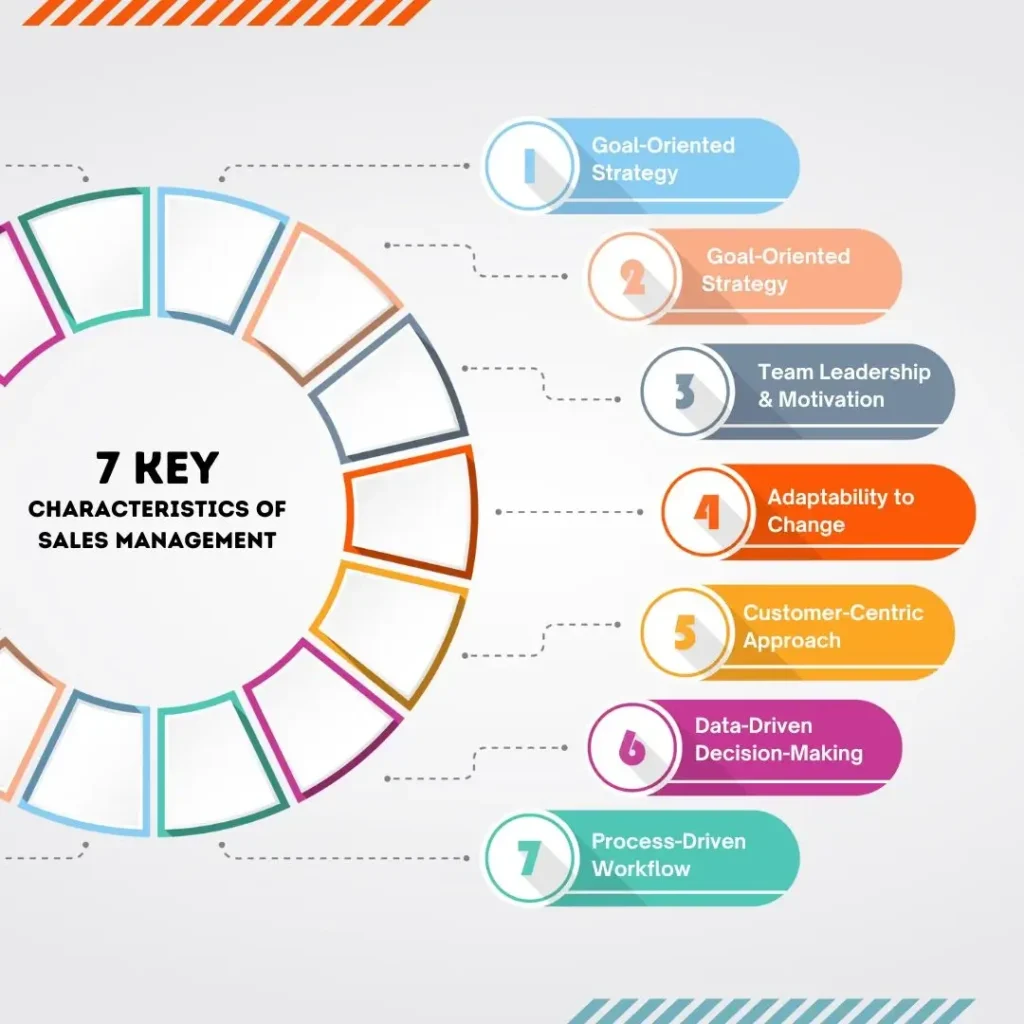7 Key Characteristics of Sales Management

Table of Contents
ToggleEver wondered why some sales teams consistently hit their targets while others struggle? The difference often comes down to one thing: strong sales management. It’s not just about closing deals — it’s about guiding people, setting clear goals, and making smart decisions. In this post, we’ll break down the key characteristics of sales management that separate good managers from great ones.
What Is Sales Management?
Sales management is the process of planning, leading, and guiding a sales team to achieve specific business goals. It involves setting sales targets, training team members, developing strategies, and tracking performance to ensure consistent growth.
In simple terms, sales management ensures that a company’s products or services are sold efficiently to the right customers at the right time, helping the business grow in a structured and repeatable way.
Real-World Analogy: Think of a Sports Team Coach
Imagine a sales manager as a coach of a competitive sports team.
Just like a coach develops strategies, trains players, and chooses who plays which role, A sales manager trains the sales team, plans sales tactics, and assigns leads or tasks.
In both cases, the goal is the same: to win—whether it’s a game or a big sales quarter.
The manager motivates the team, aligns them to shared goals, and keeps performance on track. especially by helping team members to convince a customer to buy a product with the right strategies and messaging.
Why Sales Management Matters?
1. Drives Sales Growth
A strong sales management system ensures clear targets and efficient execution.
By analyzing results and refining strategies, sales managers help the team close more deals and increase revenue.
2. Improves Team Productivity
Good sales management creates a focused, high-performing team. It includes:
Hiring skilled reps
Providing regular training
Using CRM tools to streamline workflows
Keeping the team aligned and motivated
This leads to better time management and higher output per rep.
3. Supports Strategic Customer Engagement
Sales managers shape how the team connects with customers. They train reps to:
Understand buyer needs
Personalize communication
Build long-term relationships
This strategic engagement boosts customer loyalty, repeat sales, and brand reputation.
7 Key Characteristics of Sales Management

Effective sales management is built on a foundation of clear strategy, strong leadership, and customer focus.
Below are the key characteristics that define high-performing sales teams and managers.
1. Goal-Oriented Strategy
Every successful sales operation begins with a clear, measurable goal.
Effective sales managers set specific targets and track them through Key Performance Indicators (KPIs).
When sales teams know exactly what they’re aiming for—and how they’re measured—they stay focused, motivated, and aligned with broader business objectives.
Think of it like a game with a scoreboard: knowing the goal and monitoring the score keeps everyone driven and allows for real-time course correction.
2. Strong Communication Skills
Communication is the lifeblood of any sales team.
Internally, sales managers promote open dialogue, feedback loops, and collaboration across the team.
Externally, strong communicators build trust with customers by clearly articulating value, actively listening, and tailoring their message.
From sharing goals and updates to handling objections or closing deals, effective communication skills fuel performance at every stage of the sales cycle.
3. Data-Driven Decision-Making
Top sales managers rely on data and analytics, not guesswork.
They use CRM platforms and sales forecasting tools to make informed decisions, spot trends, and guide their teams with precision.
By regularly reviewing sales metrics and customer insights, managers can optimize strategy, improve forecasting accuracy, and drive scalable growth.
4. Team Leadership & Motivation
Sales managers are more than task-givers—they’re coaches and motivators.
Strong leadership means setting clear expectations, offering constructive feedback, and recognizing individual and team wins.
Incentive programs, team recognition, and ongoing training fuel motivation and loyalty.
Great managers lead by example and empower their teams to perform at their best.
5. Adaptability to Change
The sales environment evolves rapidly—new tools, shifting buyer behavior, and economic shifts.
Effective managers stay ahead by embracing change, adapting processes, and coaching their teams to do the same.
This agility not only helps overcome challenges but also turns disruption into opportunity.
6. Customer-Centric Approach
At the core of successful sales management is a deep focus on the customer.
Top-performing managers instill a mindset of listening first, selling second.
By understanding customer pain points, building trust, and providing personalized solutions, teams foster loyal, long-term client relationships and repeat business.
7. Process-Driven Workflow
Consistency breeds results. A standardized sales process ensures every lead is handled efficiently and every deal follows a proven path.
This reduces confusion, accelerates onboarding, and minimizes mistakes.
Effective managers continuously refine workflows, enforce best practices, and eliminate friction from the sales cycle.
Bonus: Traits of a Successful Sales Manager
In today’s competitive sales environment, technical know-how alone isn’t enough.
The most successful sales managers excel in soft skills that drive team performance, build trust, and resolve friction.
Here are three essential traits every high-performing sales leader must have—and how tools like Calliyo CRM can help reinforce them in daily sales operations.
Emotional intelligence
Emotional Intelligence is the ability to recognize, understand, and manage your own emotions, while also being in tune with the emotions of others.
Why It Matters in Sales Management:
Sales is high-pressure. A manager with strong EQ builds trust, motivation, and resilience across the team.
They can spot when a rep is struggling, step in with empathy, and handle stress constructively, improving both morale and performance.
Practical Example:
If a team member loses a big deal and feels defeated, a manager with emotional intelligence doesn’t just focus on the numbers.
Instead, they acknowledge the setback, offer support, and coach the rep on what to improve.
This keeps morale high and helps the team bounce back faster.
How Calliyo Helps:
Calliyo CRM gives managers full visibility into team activities and performance patterns, allowing them to spot dips early, personalize support, and build emotionally intelligent leadership habits using real-time call tracking and team insights.
Time management
Time management is the ability to plan and control how your time is spent across tasks, ensuring maximum productivity.
Why It Matters in Sales Management:
Sales managers juggle meetings, coaching, reporting, and pipeline management. Without structured time management, things slip through the cracks.
Good time management also sets the tone for the team and prevents burnout.
Practical Example:
A top-performing sales manager blocks time for specific tasks—morning pipeline reviews, afternoon coaching calls, end-of-day reporting—ensuring each task gets full focus and nothing critical is missed.
How Calliyo Helps:
Calliyo CRM streamlines repetitive workflows and offers automated call logging, task reminders, and team dashboards, so managers can focus on coaching and strategic work, not admin.
This saves hours every week and makes time management a breeze.
Conflict resolution
Conflict resolution is the ability to address disagreements and resolve them constructively, without damaging relationships or momentum.
Why It Matters in Sales Leadership:
Disputes over lead assignments, commissions, or miscommunication with clients can derail team unity.
A skilled manager must address issues early, mediate fairly, and guide teams back to collaboration.
Practical Example:
When two reps argue over a key lead, an effective manager listens to both sides, clarifies the lead ownership policy, and mediates a resolution, turning a potential clash into a learning moment.
How Calliyo Helps:
With Calliyo’s call history tracking, lead assignment logs, and communication records, sales managers have the context they need to resolve conflicts fairly, backed by transparent data.
This fosters a trust-based sales culture and keeps teams aligned.
How to Develop These Characteristics
Sales managers in 2025 need more than just a sharp understanding of sales techniques—they must demonstrate leadership traits that drive growth, adaptability, and team cohesion.
Below are six critical characteristics of sales management, along with practical ways to develop them using modern tools, expert courses, and real-world success examples.
1. Emotional Intelligence (EQ)
Why It Matters: Emotional intelligence helps managers build trust, reduce friction, and navigate high-pressure situations with calm and empathy.
How to Develop:
- Take courses such as Yale’s “Emotional Intelligence for Leaders” or LinkedIn Learning’s EQ modules.
- Develop daily self-awareness habits through journaling or mindfulness apps.
- Build empathy with regular one-on-one meetings and honest feedback sessions.
Recommended Tools & Courses:
- Headspace or Calm (mindfulness)
- Harvard ManageMentor: Emotional Intelligence
- LinkedIn Learning: Developing Emotional Intelligence
Real-World Example: Salesforce credits much of its high team morale and customer loyalty to emotionally intelligent management practices.
2. Time Management
Why It Matters: Effective time management enables sales leaders to focus on strategic priorities without getting lost in day-to-day distractions.
How to Develop:
- Use digital calendars for time-blocking essential tasks.
- Run weekly planning sessions and conduct time audits with apps like RescueTime.
- Apply prioritization models like the Eisenhower Matrix.
Recommended Tools & Courses:
- Todoist (task management)
- RescueTime (productivity tracking)
- Coursera: Time Management for Personal & Professional Productivity
Real-World Example: A HubSpot manager implemented calendar blocking and weekly planning reviews, leading to faster follow-ups and higher close rates.
3. Conflict Resolution
Why It Matters: Unresolved conflicts can disrupt team dynamics and derail performance. Strong conflict resolution skills help maintain a productive environment.
How to Develop:
- Role-play conflict scenarios during team workshops.
- Use the SBI (Situation-Behavior-Impact) feedback model.
- Attend specialized training like Crucial Conversations seminars.
Recommended Tools & Courses:
- LinkedIn Learning: Conflict Resolution Fundamentals
- Harvard Negotiation Project materials
- Mediate.com (mediation techniques)
Real-World Example: A pharmaceutical sales team saw a 30% boost in collaboration after managers were trained in structured conflict resolution.
4. Communication Skills
Why It Matters: Clear communication builds alignment, improves collaboration, and reduces errors across sales operations.
How to Develop:
- Practice active listening and feedback summarization.
- Use communication platforms like Slack or Microsoft Teams.
- Schedule regular open-office sessions and team syncs.
Recommended Tools & Courses:
- Grammarly (writing clarity)
- Toastmasters International (public speaking)
- Coursera: Improving Communication Skills
Real-World Example: SAP sales managers reported higher team satisfaction and faster project delivery after investing in communication training.
5. Goal-Setting
Why It Matters: Clear, measurable goals create focus, drive accountability, and make success scalable.
How to Develop:
- Use the SMART framework to define objectives.
- Review KPIs and progress weekly using dashboards.
- Celebrate wins and adjust plans based on performance data.
Recommended Tools & Courses:
- Asana or Trello (goal tracking)
- 15Five (performance management)
- LinkedIn Learning: Goal Setting for Leaders
Real-World Example: A tech firm saw 15%+ growth in quarterly performance after adopting SMART goals and using public dashboards.
6. Data-Driven Decision Making
Why It Matters: Data enables managers to make informed decisions, optimize strategies, and scale what works.
How to Develop:
- Take analytics or sales operations courses.
- Regularly review CRM, funnel, and conversion data.
- Use A/B testing and team dashboards to guide strategy.
Recommended Tools & Courses:
- Salesforce, Zoho, or HubSpot (CRM data analytics)
- Tableau or Power BI (data visualization)
- upGrad: Executive Programme in Generative AI for Leaders
Real-World Example: Sales teams using AI-driven dashboards at Salesforce quickly identified funnel issues, adjusted tactics, and exceeded industry benchmarks.
Conclusion
Mastering the key characteristics of sales management isn’t just beneficial—it’s essential for driving consistent growth in today’s competitive landscape.
From setting clear goals and communicating effectively to embracing data and leading with empathy, each trait plays a vital role in building high-performing sales teams.
Let’s recap the seven core characteristics of successful sales management:
- Goal-Oriented Strategy
- Strong Communication Skills
- Data-Driven Decision-Making
- Team Leadership & Motivation
- Adaptability to Change
- Customer-Centric Approach
- Process-Driven Workflow
And to take it a step further, we explored the bonus traits that define truly exceptional sales managers: emotional intelligence, time management, and conflict resolution—soft skills that fuel trust, accountability, and long-term success.
Whether you’re a new sales leader or a seasoned manager refining your strategy, continuously developing these skills through expert resources, digital tools, and real-world practice will position you—and your team—for lasting impact.
Frequently Asked Questions(FAQs)
Effective sales management includes goal-oriented strategy, strong communication, data-driven decision-making, team leadership, adaptability, customer focus, and process-driven workflows. These traits help sales teams operate efficiently and grow consistently.
Sales management is crucial because it drives revenue, aligns team performance with business goals, and ensures a structured approach to customer engagement. It improves productivity, forecasting accuracy, and team morale—ultimately impacting a company’s growth and market position.
A good sales manager combines emotional intelligence, time management, conflict resolution, and leadership skills. They support their team, set clear goals, resolve issues fairly, and adapt to change while focusing on customer success.
Core functions include setting sales targets, training reps, developing strategies, monitoring performance, and refining workflows. Features often include CRM tools, reporting dashboards, sales forecasts, and team coaching frameworks.
No. Management focuses on processes, planning, and performance, while leadership inspires, motivates, and guides the team. Great sales managers blend both—managing operations and leading people to success.
